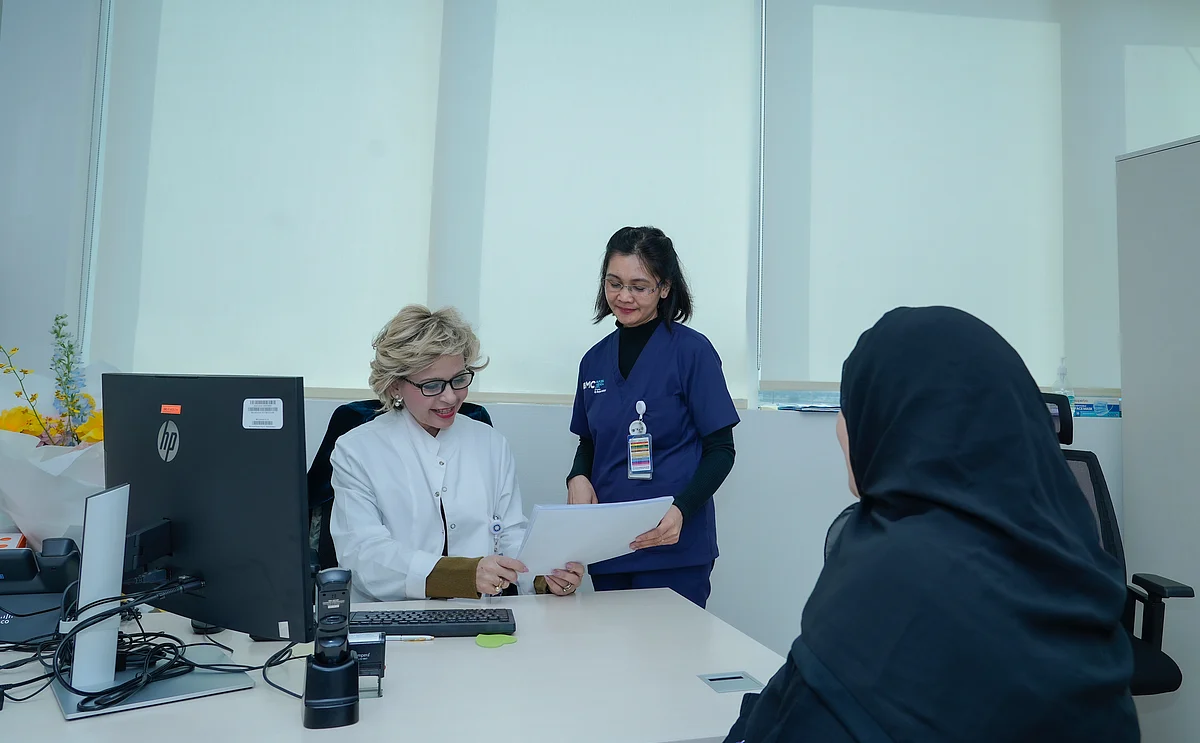
UAE: Breast Cancer Detected During Pregnancy, Early Screening Saves Emirati Mother
Maryam Rashid Al Habsi, a mother of eight, was 29 weeks pregnant with her youngest child when she was diagnosed with breast cancer. What she thought was normal swelling linked to pregnancy, turned out to be an 8-centimeter invasive ductal carcinoma with lymph node involvement.
“It was shocking, but I put my trust in the Almighty,” said Maryam.“My family stood by me throughout.”
Recommended For YouDoctors faced a challenge treating the cancer while keeping both mother and baby safe. A team of specialists from oncology, obstetrics, fetal medicine, and gynecology worked together to create a careful plan. Because imaging was limited during pregnancy, they relied on ultrasound and minimal radiation scans to confirm the diagnosis.
Stay up to date with the latest news. Follow KT on WhatsApp Channels.
Maryam, 40, began chemotherapy at a safer level during late pregnancy.“The decision was based on her young age, the tumor size, and the presence of lymph nodes,” said Dr Sonia Otsmane, consultant medical oncology at Burjeel Cancer Institute.
Throughout her treatment, fetal health was monitored closely. At 35 weeks, Maryam delivered a healthy baby boy weighing 2.2 kilograms. Two weeks after delivery, she continued with stronger chemotherapy, followed by a mastectomy and radiation therapy. To prevent recurrence, doctors prescribed hormone therapy for 10 years and targeted medication for two years.
She was also given Abemaciclib, a targeted cancer drug that helps reduce the risk of the disease returning, and ovarian suppression therapy to stop hormone production. To protect her bones during long-term treatment, she receives Prolia injections every six months for three years.
“After surgery, I struggled with depression and body image issues. But with counseling and faith, I found strength again,” said Maryam.“Now, I know how important early detection is. Getting tested at the right time can save your life.”
As Breast Cancer Awareness Month, also known as Pink Month, comes to an end, stories like Maryam's remind women that breast cancer can affect anyone, even those with no family history.
Doctors say early detection remains the most powerful tool in saving lives. Regular screenings can help find cancer before symptoms appear, giving patients a much better chance of recovery. Some women delay screening due to fear or because they think they are not at risk if no one in their family has had cancer.
“Only around five per cent of breast cancers are hereditary,” said Dr Sonia.“That means 95 per cent of cases develop in women without any family history. Every woman should make screening a part of her routine.”
Maryam and her husband also went through genetic counseling and BRCA testing due to her young age and the aggressive nature of her cancer. The results showed no genetic mutations, but her husband's family did have a history of cancer.
Knee pain leads to cancer diagnosisFor Moza Alshehi, a mother of six, the first sign of cancer wasn't a lump but pain in her knee. What she thought was muscle strain turned out to be something far more serious.
“I felt pain in my knee one night, and it kept getting worse,” she said.“It became so bad that I could barely walk.”
Initially, she was told it might be a clot or an injury. But further tests revealed that the pain was caused by cancer that had spread to her bones.“When the doctor told me I needed surgery within a week because delaying it could lead to amputation, I realised how serious it was,” said Moza.
She decided to stay in the UAE for treatment, even though her family suggested going abroad.“Being close to my family gave me strength,” she said.
Dr Sonia said that Moza had a large painful mass near her left knee and a lump in her right breast. Tests confirmed HER2-positive invasive ductal carcinoma that had spread to her lungs, skull, and bones.“Such cancers usually spread to the liver or brain, not the limbs,” said Dr Sonia.
The medical team created a plan combining chemotherapy with targeted drugs, pertuzumab and trastuzumab, to attack the cancer cells.“Within three months, we saw significant improvement,” said Dr Sonia.
After seven months of treatment, scans showed no visible cancer. A PET-CT scan confirmed complete response, and Moza was declared free of the disease. She now continues with Phesgo, a combination of the same targeted drugs given through an injection that takes only 10 minutes, helping her spend less time in the hospital and maintain her daily routine.
“When the doctor told me I was cancer-free, I cried,” said Moza.“Faith and love for life helped me stay strong through the toughest time of my life.”
Moza urged women not to wait wait for symptoms and recommended the test that will save your life.“Don't believe scary stories about screening or treatment. Early detection gave me a second chance, and that's something I will always be grateful for," she said.

Legal Disclaimer:
MENAFN provides the
information “as is” without warranty of any kind. We do not accept
any responsibility or liability for the accuracy, content, images,
videos, licenses, completeness, legality, or reliability of the information
contained in this article. If you have any complaints or copyright
issues related to this article, kindly contact the provider above.


















Comments
No comment